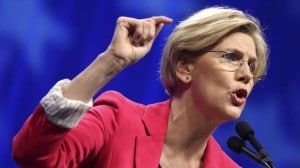Elizabeth Warren Leaps Over Primary Challenge In Massachusetts
June 3, 2012
 NPR – Democratic U.S. Senate candidate Elizabeth Warren addresses the Democratic State Convention before the delegate vote in Massachusetts Saturday.
NPR – Democratic U.S. Senate candidate Elizabeth Warren addresses the Democratic State Convention before the delegate vote in Massachusetts Saturday.
Democrat Elizabeth Warren will not have to face a primary challenger in the Massachusetts Senate race. The Harvard Law School professor and consumer advocate secured more than 95 percent of the delegate vote today at her party’s state convention.
Lynn Jolicoeur of member station WBUR in Boston reports that Warren’s margin was the largest ever in such a race in Massachusetts. Warren’s challenge now is incumbent Republican Sen. Scott Brown.
Democratic Party chair John Walsh said Warren would “make Massachusetts families proud,” as the Boston Herald reports:
“Elizabeth Warren made history today because of the strength of her impressive grassroots organization and her record as a tireless advocate for middle class families throughout Massachusetts.”
As WBUR’s Jolicoeur tells our Newscast Unit, avoiding a primary with immigration attorney Marisa DeFranco means Warren can now focus all of her attention on what is expected to be a tight race with Brown. And that’s just what Warren did in her speech before Saturday’s vote:
“Whoever he once was, I can tell you who he is now: Scott Brown is a Wall Street Republican. A big oil Republican. A Mitt Romney Republican.”
Warren also evoked Sen. Ted Kennedy, saying she would do her “best to honor his memory” and that “it’s a long way from Ted Kennedy to Scott Brown.”
New polls from the Boston Globe and Western New England University show Warren and Brown are in for a battle, with only a couple percentage points between them.
Warren’s official nomination comes after weeks of controversy over her claims to Native American heritage. As we reported Thursday, she acknowledged that she told law schools at Harvard and University of Pennsylvania of her background. Her campaign has said that she is 1/32nd Cherokee.
The Globe poll found that 72 percent of voters said the issue will not affect their vote, but 31 percent of self-described independents said it makes them less likely to support her.
